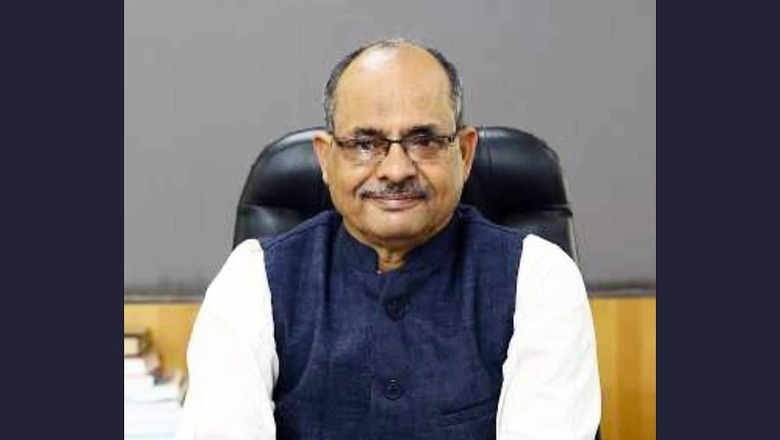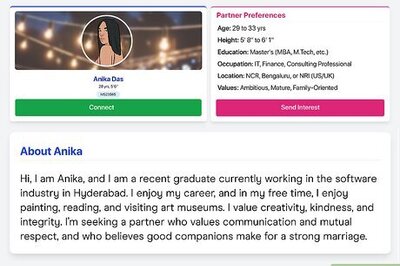
views
From getting a “brand value” to changing “perception” and attracting the “best talent pool” from across the country, a lot will change for this newly christened IIM-Mumbai, director Prof Manoj K Tiwari told News18 in an exclusive interview.
Formerly the National Institute of Industrial Engineering (NITIE), the institution became the 21st IIM last month when the Union government amended the IIM Act 2017 and initiated the procedure to convert the institute into an IIM. It is the first such move for the premium B-schools in the country since all existing IIMs were newly set up institutes.
IIM-Mumbai, which, so far, offered courses only for engineering graduates, will now be open to students from all backgrounds. Admissions to IIMs are done on the basis of the Common Admission Test (CAT).
Professor Tiwari, himself a supply chain management expert, took the institute’s charge as director in 2019. Speaking to News18, he touched upon how the IIM tag will change the perception people have of the institute, get the best talent both in terms of faculty and students from across the country and gain prestige granting MBA degrees instead of diplomas. The institute, which is celebrating its diamond jubilee year, he said, is looking forward to living its new identity.
Edited excerpts:
Why did the NITIE need an IIM tag?
Despite being a reputed institution, we were not on the list of ‘Institutes of National Importance’. Over the past six or seven years, I saw that many new IIMs have been granting MBA degrees, while we could only grant PG Diplomas. Many foreign institutions had even begun to question if the diploma certificates issued by us were equivalent to an MBA degree. We faced a lot of embarrassment on this front; if we don’t have the status of granting degrees, then we cannot have the brand value that is required in the present-day scenario.
Our alumni have done credible work, which we are proud of, but not being able to offer degree programmes was always a concern. We couldn’t issue additional certificate stating that our courses are equivalent to an MBA and wanted a solution to this problem. We have been doing well and even the structure of our academic programmes as well as administration are close to those of the IIMs, but we didn’t have the same brand value as them. This is what made us seek an IIM tag.
Now that the IIM Act has been amended with more powers vested in the government, do you think IIMs will be able to carry on with their autonomous character? Do you think top institutions in the country should be fully autonomous?
In our case, we are happy that we finally have this academic autonomy to grant degrees. Since this institution was established in 1963, we have been abiding by all its principles just like other top-ranking institutions such as IITs. When public money is being spent, it’s imperative that we have autonomy alongside accountability. It cannot be just one-way. I have previously taught at IIT-Kharagpur, where like all other IITs, Visitor has his nominees and a say in the Board of Governors, which has never been an issue with the institute.
Now that the NITIE is an IIM, what will change for the institute?
This is the big change that we have been waiting for. It will add to our brand value, besides a lot of other things from perception to funding to getting the best talent from across India. So many students, even from IITs, would apply to us every year, but would either not join or migrate to other management institutes. This shall change now.
We are hopeful of attracting top scorers from all over and we will offer them a relaxation in fee if required in case of those coming from rural and less privileged backgrounds. Also, we aim to up the gender ratio for female students to at least 35% in the initial years and later to 50%. It will also help bridge the gap between engineering and management. So far, only those wanted to join NITIE would apply, but now, as an IIM, we will get applications from across states and our talent pool is definitely going to widen.
In terms of placements, while we have always had most of the top recruiters coming down to hire, with the IIM tag, we just hope that some of the big financial firms, which have not been so forthcoming or would hire less candidates, will come out more openly.
The NITIE was ranked 7th in management category in the NIRF rankings this year. Do you think the IIM tag will help it move up the ranks? If so, on what parameters?
The only parameter on which we were lagging behind in the NIRF rankings was ‘perception’, in which NITIE was ranked 19. Even the newly established IIMs have a perception ranking of 30-40. This is strange since we have been an established institution of repute for more than 60 years and we were at par with other top-ranking engineering and management institutions in all other parameters. Only perception was creating a problem. So, I believe becoming an IIM will certainly help us improve our perception quotient.
Initially, what are the challenges before you in fully turning into an IIM?
In the beginning, there are a lot of formalities and the change of nomenclature in all documents. Also, we will have to change our admission criteria since IIMs allow graduates from any stream to apply. But the major challenge is building infrastructure so that we can increase student intake on campus.
At present, we have one hostel, while another is under construction. By next year, we should have two hostels and a lecture complex. We will take loan from the Higher Education Finance Agency as well as make use of viability gap funding of the government. Most IIMs are financially self-reliant, and while we have a year by when we will be getting government funding, we will be generating our own revenue such that we can sustain in the long-term.
Do you plan to add any new seats and introduce new programmes?
Currently, we are running three programmes and the total student intake is about 550, which can go up to about 600 from next year, which is something our Board will be taking a decision on. We are planning to have our first Board meeting in the first week of October. We will be offering three full-time (two years) management programmes instead of diploma courses. These courses with new nomenclatures – MBA (general), MBA (sustainability) and MBA (operations and supply chain management) will start from the 2024-25 session.
Besides, we plan to launch a number of executive and online programmes for experienced professionals as well. We are ready to launch an executive fintech programme in collaboration with the National Stock Exchange (NSE). We are also planning to have many collaborative courses with other top institutions in the country, including IIT-Bombay, which is one of the best as well as our next-door neighbour.
Would an IIM tag help the institute attract good faculty as well as those from foreign countries?
It’s a great advantage. We are already in the process of hiring new faculty. The IIM tag has definitely helped us reach out to the best talent pool with applications pouring in from PhD fellows enrolled in foreign institutions as well to teach here.
Earlier, we would get around five to six applications, but post becoming an IIM, we are getting 25-30 applications on a daily basis. Many industry experts have enquired about the process of application of late. The idea is to have a mix of both good industry experience professionals as well as pure academics. Currently, we have a faculty strength of 60, including the visiting faculty, which can go up to 120-130 now.
Will there be a change in the fee structure as well?
Currently, the annual fee is quite low – Rs 6.5 lakh to 7.5 lakh a year – especially when compared to an IIM where the yearly fee amounts to Rs 15-20 lakh and above. The fee structure will change obviously, but it won’t be a steep hike. We will not increase it to Rs 15 lakh or anything like that because we want our institute to be affordable and within the reach of all students. However, there will be a fee revision from next session, for which the board will take the final decision.



















Comments
0 comment